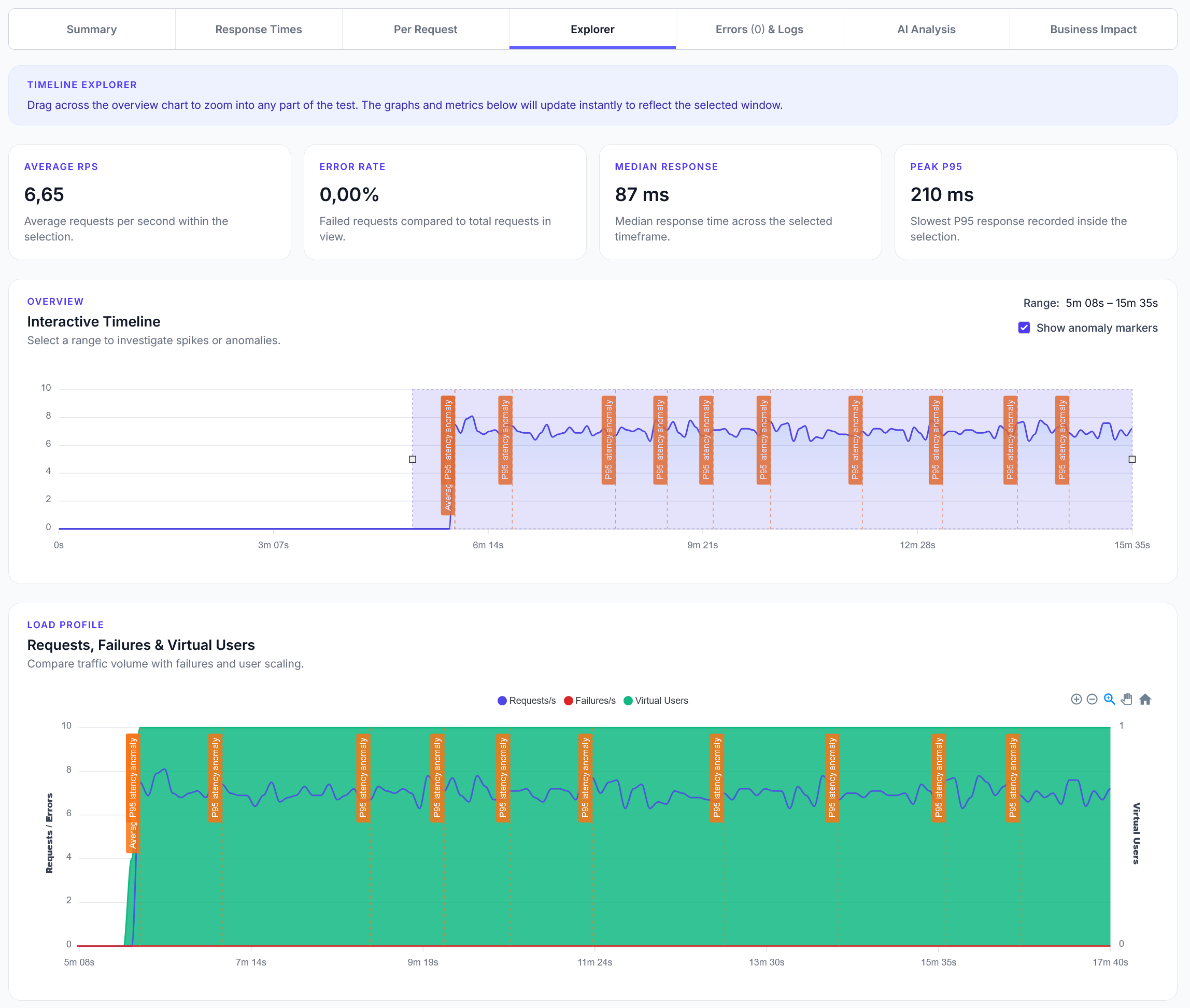
Explorer reports addition
We have added a new Explorer feature to reports, with a timeline scrubber and easy anomaly detection.
Basic payment API testing with charge, refund, and validation scenarios
LoadForge can record your browser, graphically build tests, scan your site with a wizard and more. Sign up now to run your first test.
This guide shows how to test payment APIs with common operations like charging, refunding, and validating payment methods.
from locust import task, HttpUser
import random
import json
class PaymentTestUser(HttpUser):
def on_start(self):
# Payment test data
self.test_cards = [
{"number": "4242424242424242", "exp_month": 12, "exp_year": 2025, "cvc": "123"},
{"number": "4000000000000002", "exp_month": 11, "exp_year": 2025, "cvc": "456"}, # Declined card
{"number": "4000000000009995", "exp_month": 10, "exp_year": 2025, "cvc": "789"} # Insufficient funds
]
self.amounts = [999, 1500, 2999, 4999, 9999] # Amounts in cents
self.currencies = ["usd", "eur", "gbp"]
# API endpoints
self.payment_endpoints = {
"charge": "/api/payments/charge",
"refund": "/api/payments/refund",
"validate": "/api/payments/validate"
}
@task(4)
def test_payment_charge(self):
"""Test payment charge with valid card"""
card = self.test_cards[0] # Use valid card
amount = random.choice(self.amounts)
currency = random.choice(self.currencies)
charge_data = {
"amount": amount,
"currency": currency,
"card": card,
"description": f"Test charge ${amount/100}"
}
with self.client.post(
self.payment_endpoints["charge"],
json=charge_data,
name="Payment Charge"
) as response:
if response.status_code == 200:
try:
result = response.json()
if result.get("status") == "succeeded":
print(f"Payment successful: ${amount/100} {currency}")
else:
print(f"Payment status: {result.get('status')}")
except json.JSONDecodeError:
response.failure("Invalid JSON response")
elif response.status_code == 400:
print("Payment failed: Bad request")
elif response.status_code == 402:
print("Payment failed: Card declined")
else:
response.failure(f"Payment charge failed: {response.status_code}")
@task(2)
def test_payment_declined(self):
"""Test payment with declined card"""
declined_card = self.test_cards[1] # Declined card
amount = random.choice(self.amounts)
charge_data = {
"amount": amount,
"currency": "usd",
"card": declined_card,
"description": "Test declined payment"
}
with self.client.post(
self.payment_endpoints["charge"],
json=charge_data,
name="Payment Declined"
) as response:
if response.status_code == 402:
print("Payment correctly declined")
elif response.status_code == 200:
try:
result = response.json()
if result.get("status") == "failed":
print("Payment failed as expected")
else:
response.failure("Declined card was accepted")
except json.JSONDecodeError:
response.failure("Invalid JSON response")
else:
print(f"Declined payment returned: {response.status_code}")
@task(2)
def test_payment_refund(self):
"""Test payment refund"""
# First create a charge, then refund it
card = self.test_cards[0]
amount = random.choice(self.amounts)
# Create charge
charge_data = {
"amount": amount,
"currency": "usd",
"card": card,
"description": "Test charge for refund"
}
with self.client.post(
self.payment_endpoints["charge"],
json=charge_data,
name="Charge for Refund"
) as charge_response:
if charge_response.status_code == 200:
try:
charge_result = charge_response.json()
charge_id = charge_result.get("id")
if charge_id:
# Process refund
refund_data = {
"charge_id": charge_id,
"amount": amount,
"reason": "requested_by_customer"
}
with self.client.post(
self.payment_endpoints["refund"],
json=refund_data,
name="Payment Refund"
) as refund_response:
if refund_response.status_code == 200:
print(f"Refund successful: ${amount/100}")
else:
response.failure(f"Refund failed: {refund_response.status_code}")
else:
print("No charge ID for refund")
except json.JSONDecodeError:
print("Invalid JSON in charge response")
@task(2)
def test_card_validation(self):
"""Test payment method validation"""
card = random.choice(self.test_cards)
validation_data = {
"card": card,
"validate_only": True
}
with self.client.post(
self.payment_endpoints["validate"],
json=validation_data,
name="Card Validation"
) as response:
if response.status_code == 200:
try:
result = response.json()
is_valid = result.get("valid", False)
card_type = result.get("card_type", "unknown")
print(f"Card validation: {is_valid}, type: {card_type}")
except json.JSONDecodeError:
response.failure("Invalid JSON response")
else:
response.failure(f"Card validation failed: {response.status_code}")
@task(1)
def test_invalid_payment_data(self):
"""Test payment with invalid data"""
invalid_scenarios = [
{"amount": -100, "currency": "usd", "description": "Negative amount"},
{"amount": 1000, "currency": "xxx", "description": "Invalid currency"},
{"amount": 0, "currency": "usd", "description": "Zero amount"}
]
scenario = random.choice(invalid_scenarios)
scenario["card"] = self.test_cards[0]
with self.client.post(
self.payment_endpoints["charge"],
json=scenario,
name="Invalid Payment Data"
) as response:
if response.status_code == 400:
print(f"Invalid data correctly rejected: {scenario['description']}")
elif response.status_code == 200:
response.failure(f"Invalid data accepted: {scenario['description']}")
else:
print(f"Invalid data returned: {response.status_code}")